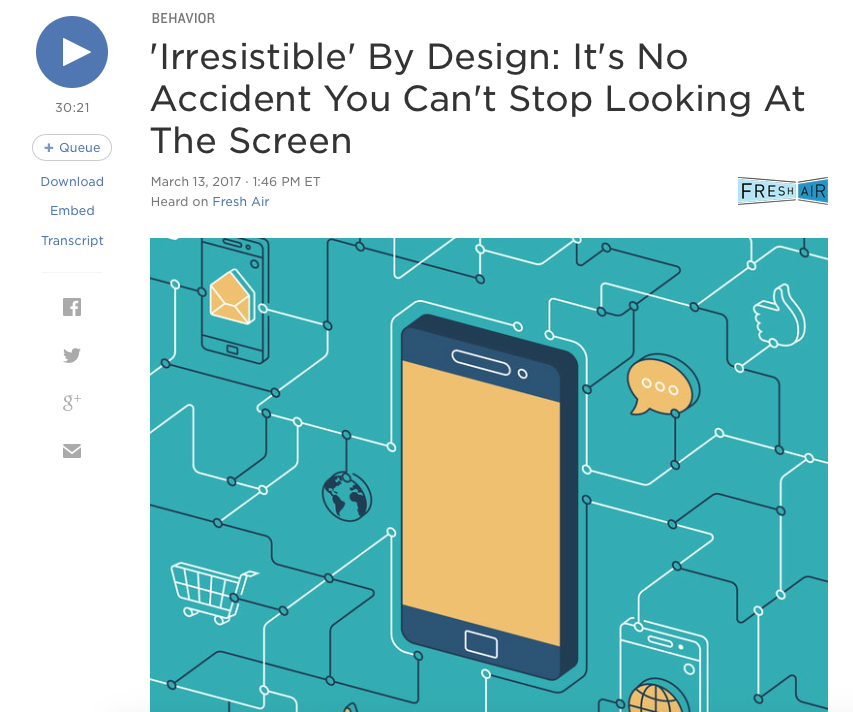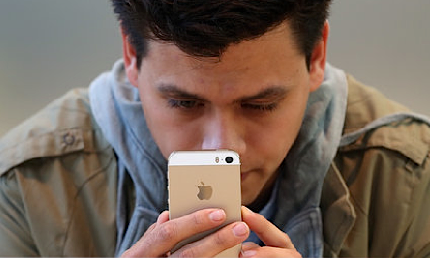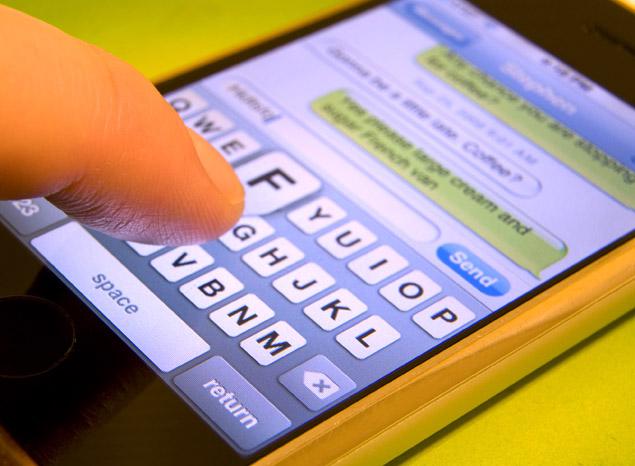The publication explores the consequences of living in a progressively digital world, and the author links our diminished attention spans to what he calls the “mainstream adoption of screens.” Alter suggests this practice began ten and seven years ago when the iPhone and iPad were introduced in 2007 and 2010. These Apple devices are impeding our ability to focus, Alter notes. Before the advent of the iPhone/iPad, the average person had an attention span of about 12 seconds. Research suggests there’s been a drop from 12 to eight seconds in just one decade, shorter than the attention span of the average goldfish at nine seconds. “Imagine the goldfish in the bowl,” he said. “You hold up a piece of paper with a picture on it, perhaps another goldfish. The average goldfish will stare at that thing for about nine seconds. Do the same thing to a human. Eight seconds later, they're on to the next thing.” I was particularly struck by several of the items Alter discussed during the program including screen time, texting, and binge-watching:
I have an iPhone, and I love it. I completely agree with Alter that my phone brings the world to me. It’s my all in one device that’s whatever I need at any given moment – a telephone, a stereo, a camera, even an entire library. I’ve had the technology for three years, and I can’t imagine not having it in my pocket or by my side at all times. Alter said research suggests technology has a physiological response on the body in the same way as drugs or alcohol. When a test subject is about to engage with their tablet or smart phone, their brain activity looks very similar to an addict who is about to inject a chemical substance such as heroin. I admit I constantly check my phone. I’m always in search of the next nugget of stimulation be it a text, an email, a photo, or a news update. I’m elated when there’s something new waiting for me, and I’m disappointed when there isn’t. Also, there have been times when I’ve temporarily misplaced my phone and I’ve flown into a panic only to be relieved once it was recovered moments later. Alter points out there’s even a term for this: “nomophobia.” It’s the fear people have of not having their phones accessible and available. Texting
“There's a sort of critical period early in our lives when we develop the faculties that allow us to communicate well, that allow us to speak face-to-face with people,” he said. As I’ve blogged about in the past, I appreciate texting – it’s fast and convenient and a time saving device. I feel much more efficient in my communication since I first begin texting regularly about eight years ago. I enjoy talking on the phone, but much of the time a call isn't necessary to impart information quickly. If I'm running behind schedule, for instance, a simple "be there in 5 min" text will usually suffice. I do, however, feel fortunate that I grew up before the existence of texting, email, and other forms of what I like to call “in between communication.” This allows me to recognize that they are supplements and not substitutes to interpersonal interaction. I understand solid relationships are built when people are in physical proximity and are able to look at one another, hear vocal inflections, read body language, and so on. Binge-Watching
Alter drew on the following Netflix data: if someone watches the first two or three episodes of any season of a show then there's about a 70 to 75 percent chance they will finish the entire series. Also, he noted 60 percent of adults say they have watched more of a program than they had initially intended.
I subscribe to Netflix and I've enjoyed several of their original series such “House of Cards,” “Orange is the New Black,” and “Love.” There are times when I’ll watch several episodes at a time, and it can be tough to power down my laptop when I’m absorbed in a storyline. And the fact that an episode begins automatically just seconds after the previous one ends also makes it hard. Like texting, I consider streaming an asset rather than a liability. I appreciate the service and I don't take streaming for granted because it wasn't long ago when it wasn’t an option. Fortunately as an adult, I have certain level of self-control and I'm able to moderate my viewing habits. However, if I was younger and I wasn’t as disciplined, I can see where it could interfere with important activities like, say, reading, writing, and arithmetic. Final thoughts: we're living in exciting times as there have been some incredible advancements in consumer electronics in a short period. While these tools can pose some navigational challenges, I'd rather have them than not. What's the alternative, anyway? Being alone with one's thoughts? I shudder!
0 Comments
Your comment will be posted after it is approved.
Leave a Reply. |
AuthorI'm Eli Natinsky and I'm a communication specialist. This blog explores my work and professional interests. I also delve into other topics, including media, marketing, pop culture, and technology. Archives
July 2024
Categories |




 RSS Feed
RSS Feed